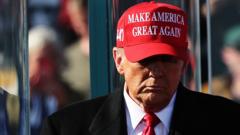Trump’s Europe policy is a lose-lose game — unless he pivots

While Donald Trump’s demands from European allies may resonate deeply with GOP stakeholders and the Republican electorate, there has been little consideration of the fact that his articulated Europe policy — or at least what is known of it — may ultimately prove self-defeating. Rather than making Europe less reliant on U.S. security guarantees, it risks leaving the continent more vulnerable to both Russian aggression and Chinese economic dominance.
Europe, for its part, is bracing for the worst, albeit in its characteristically fragmented and uncoordinated fashion. The European Commission is reportedly devising deterrence-based scenarios in anticipation of an almost inevitable trade clash with the U.S., while member state governments are busy currying favor with potential figures in a future Trump administration. Their hope? Securing even a sliver of goodwill or, at best, preferential treatment over fellow Europeans in matters of defense spending or trade negotiations.
From what can be discerned of Trump’s prospective strategy, two priorities stand out: reducing the U.S. trade deficit with the EU and pushing European allies to shoulder more of the defense burden. These are not radical objectives; in fact, they reflect enduring U.S. national interests and enjoy considerable bipartisan support. Both burden-sharing and safeguarding strategic advantages in key industrial sectors have also been hallmarks of the Biden administration’s approach.
The real difference lies not in the objectives themselves but in the methods employed to achieve them.
The Biden administration grasped a crucial truth: Europe can deliver more only if it acts collectively. This recognition explains why, perhaps for the first time in history, the president of the European Commission — Ursula von der Leyen — has emerged as a central figure in transatlantic relations. Partly owing to leadership voids in Berlin and Paris, and partly as an implicit acknowledgment of the EU institutions’ growing authority, Washington deepened its engagement with Brussels, often at the expense of bilateral relations with member states.
This approach fostered greater European unity. While Biden did not hesitate to impose economic pressures on Europe — most notably through the Inflation Reduction Act — he generally avoided sowing divisions among allies to advance U.S. interests.
Trump, by contrast, embraces a divide-and-conquer strategy toward the EU. He demands that European NATO members ramp up defense spending to as much as 3 percent of GDP but opposes deeper European defense integration. Instead, he favors these countries purchasing off the shelf U.S. military hardware rather than investing in their own defense industries. Simultaneously, Trump envisions imposing unprecedented tariffs on European industrial exports while insisting the EU align more closely with Washington on China, including trade and investment, Taiwan, and freedom of navigation in the Indo-Pacific.
Complicating matters further, Trump aligns himself ideologically with Europe’s illiberal leaders, such as Hungary’s Viktor Orbán, and far-right parties like Germany’s AfD. By doing so, he actively stokes divisions within the EU, seemingly indifferent to the fact that these actors’ pro-Russian, pro-Chinese and anti-EU agendas directly undermine the ability of EU member states to meet his own expectations.
At a glance, it is clear that Trump’s square of priorities — greater defense burden-sharing, closer alignment on China, reduced trade deficits and support for Europe’s radical right — are incompatible. Pursuing one set of goals inherently jeopardizes the others.
For example, imposing sweeping tariffs and empowering Europe’s far-right might destabilize the economic and political foundations needed for Europe to take greater responsibility for its own security or to present a unified stance against China. This scenario leads to a lose-lose outcome: a Europe increasingly exposed to Chinese and Russian influence in both economic and security realms — hardly a strategic victory for any U.S. administration.
In contrast, the U.S. could get an EU which, with the notable exception of nuclear deterrence, is prepared to enhance its efforts in addressing hard security challenges and is willing to closely coordinate on China. The price for this, however, would be abandoning divisive policies, particularly the pampering of the European radical-right, and providing a trade lifeline for Europe’s export-oriented industries.
That could evolve into a win-win scenario from a realist perspective, only requiring Washington to carefully select the right policy goals from Trump’s original square of priorities. A comprehensive transatlantic agreement on trade and security could help balance the U.S. trade deficit through increased energy exports to Europe while securing European strategic commitments regarding China and security in the Pacific region. Instead of engaging in trade conflicts with Europe, Trump should focus on dealmaking.
As is often the case with conflicting priorities, no one — not even Trump — can achieve them all. The future of the transatlantic partnership offers no win-lose scenarios; it is either win-win or lose-lose. The incoming administration must choose which road to take in its approach to Europe.
Daniel Hegedüs is regional director for Central Europe at the German Marshall Fund of the United States.
Topics
-

Donald Trump won the election. Now he’s losing it.
Trump was not hired to gut the Justice Department, abolish the FBI, pardon the Jan. 6 insurrectionists, weaken our intelligence agencies, eliminate the Department of Education or “go wild on health.”Politics - The Hill - 5 days ago -

Trump says he could lose: 'Bad things could happen'
Former President Trump told ABC News on Sunday that he could imagine losing the presidential election to Vice President Harris. ABC News chief Washington correspondent Jonathan Karl talked to the ...Politics - The Hill - November 4 -

Bezos pushes back on Musk claim he said Trump would lose
Jeff Bezos is pushing back on a claim from fellow billionaire Elon Musk that the Amazon founder and Washington Post owner predicted former President Trump would lose this month's presidential ...Politics - The Hill - November 21 -

Trump said he can't run in 2028 unless the GOP figures 'something' out: Could that happen?
President-elect Donald Trump, during a meeting with House Republicans on Wednesday, made an apparent joke in which he remarked that the GOP might want to “do something” that would somehow allow him ...Politics - The Hill - November 17 -

Welfare state at risk unless Europe halts decline in growth, says Lagarde
ECB president also warns of heightened global trade tensions as ‘rival blocs’ formBusiness - Financial Times - November 18 -

Carr's return to the Saints' lineup is horrendous as he loses his top target, the game and his coach
Nothing went right in Derek Carr's return to the New Orleans Saints' lineup in Week 9Sports - ABC News - November 5 -

US and Europe diverge on monetary policy as Trump scrambles outlook
Big central banks’ rates trajectories part ways as Eurozone wrestles with sluggish growthBusiness - Financial Times - 5 days ago -

Nigel Farage urges Trump to accept defeat if he loses and 'go play golf'
Nigel Farage, a member of U.K. Parliament who helped lead the nation's campaign to leave the European Union, urged former President Trump to "accept the result" of the U.S. election, whichever way ...Politics - The Hill - November 5 -

Seven things Trump says he will do as president
From immigration to the Ukraine war - these are the pledges he made ahead of his return to the White House.Top stories - BBC News - November 6
More from The Hill
-

Gaetz saga moves toward final act in House
Politics - The Hill - 1 hour ago -

Sunday shows preview: Trump transition slowly begins; Israel-Hezbollah's rocky ceasefire
Politics - The Hill - 1 hour ago -

Trump names Charles Kushner, father of son-in-law, as ambassador to France
Politics - The Hill - 1 hour ago -

What is Bluesky, the 'up-and-coming' social platform seen as X alternative
Politics - The Hill - 2 hours ago -

What Trump's expected withdrawal from global climate efforts means for the environment — and the economy
Politics - The Hill - 3 hours ago